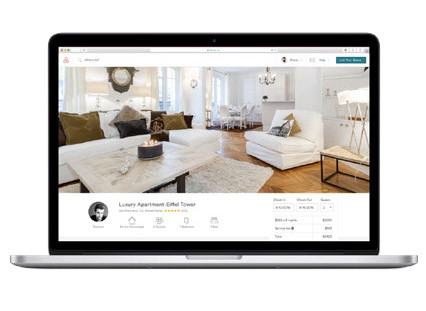ARE VACATION RENTALS LIKE AIRBNB the wave of the future? Hotels are certainly sounding the alarm. The short-term lodging company grew exponentially since its founding, and its soaring popularity seems to threaten the business models of even the most established hotels.
Airbnb allows hosts to rent out all or part of their home, while travelers can book through the website or mobile app. Users can filter search results by lodging type, date, location and price. The company charges both guests and hosts a small percentage fee.
Today Airbnb operates corporate offices in 20 cities around the world. The company’s portfolio of lodgings reached 4 million in 65,000 cities and 191 countries. Some 260 million overnight stays have been facilitated via Airbnb. Its growth continues, thanks to a number of factors that make it more attractive than hotel rentals to many travelers.
The sheer number and diversity of listings offers greater flexibility and a wider spectrum of prices to accommodate budget and luxury travelers alike. And many travelers prefer the experience of staying in a unique rental rather than a chain hotel. They can interact with their hosts, enjoy a local neighborhood and escape the crowds. Because Airbnb is often cheaper than hotels, its entrance into the market forced hotels to lower their prices to stay competitive.
But the tug-of-war over travelers’ pocketbooks is anything but decided. Hotels remain attractive to many travelers, and cities are beginning to regulate short-term rentals like Airbnbs, thus capping their growth.
Airbnb was founded in 2007 by roommates Brian Chesky and Joe Gebbia, who decided to rent out an air mattress in their living room when they could not afford their own rent. Later, cofounder Nathan Blecharczyk came on board, and the trio named their venture AirBed & Breakfast. The first iteration of the website launched in 2008, and by March 2009 the brand evolved into Airbnb. The offerings expanded from air beds to include whole apartments, private rooms, boats, tree houses, tents and other properties.

Business Travel Product © AIRBNB
The company continued to grow, raising money from numerous investors and further refining and expanding its brand. Airbnb became profitable in 2016, with its revenue growing more than 80 percent from 2015 to 2016. Earlier this year, Chesky announced the company’s plans to start an airline, and the company added luxury listings called Beyond by Airbnb. It seems there’s no end in sight for Airbnb’s meteoric success.
But the company faced its share of headwinds. In October 2016 New York Gov. Andrew Cuomo signed a bill fining Airbnb for violating local housing laws. Other cities started forcing Airbnb to collect a transient occupancy tax and comply with other regulations. As a result, Airbnb published a list of regulations by city, but the list does not extend to cities located outside the United States.
Airbnb also faced backlash for its pricing structure, which displays a per-night fee that does not include add-ons like cleaning fees. The total price is not shown until after a customer initiates the booking process. In 2015 the Australian Competition and Consumer Commission took action, and now Airbnb’s Australian site shows the total price including all charges at the earliest stage of the search process.
Many cities struggle with Airbnb’s impact on housing costs. Studies show Airbnb tends to drive up rental prices in many neighborhoods as landlords keep long-term rentals off the market in favor of short-term Airbnb offerings, making it hard for renters in already tight markets like San Francisco and Seattle.
A 2017 study showed increasing Airbnb listings in any neighborhood by 10 percent leads to a 0.42 percent increase in rents and a 0.76 percent increase in the housing process. Several cities implemented restrictions on short-term rentals, impacting Airbnb listings. And landlords and homeowners associations in many areas restricted the number of units that can be used for short-term rentals or banned the practice outright. These include San Francisco; Portland, Ore.; New York City; and Toronto.
The hotel industry says it is losing customers to cheaper Airbnb listings, and it’s lobbied hard against the company. Hotels argue they’ve had to meet high safety standards and certifications, while Airbnb rentals skirted these rules. The American Hotel and Lodging Industry, which includes members like Marriott International, Hilton Worldwide and Hyatt Hotels, launched a concerted effort in 2016 to combat Airbnb’s success.
Though hotel executives originally downplayed Airbnb’s effects on their industry, the plan revealed a multifaceted attack was underway that aimed to limit Airbnb’s impact on a local, state and national level. This included exposing the way Airbnb hosts skirt laws hotels must comply with — including rules related to antidiscrimination and tax collection — and funding anti-Airbnb research.

Business traveler © AIRBNB
Hotels also respond by changing the way they do business. Many modernized their brands, offering homier room designs and adding partnerships with local businesses to better appeal to travelers craving a unique experience in a place rather than a generic, chain-generated stay. Others added new technology aspects like keyless entry and appdriven experiences.
Hotel owners may be able to place some faith in the millennial generation of travelers. A 2018 study called Future of Millennial Travel Report from Resonance Consultancy showed at least for U.S. travelers aged 20–36, hotels were the preferred lodging choice when they left home overnight.
The study reported half of these travelers regularly or occasionally stay in an Airbnb or other home sharing setup, but fewer than one in four say it’s their preferred lodging. Instead, they favor full-service hotels as their top pick, followed by staying with friends or family, then all-inclusive resorts and, finally, luxury hotels and resorts. They even prefer camping (33 percent) over short-term rentals (23 percent).
This is “contrary to the prevailing belief that hotels are in trouble with younger travelers who prefer homesharing,” said Chris Fair, president, Resonance Consultancy, which consults on topics of tourism, real estate and economic development.
Travelers are finding Airbnb rentals may lack the amenities millennial travelers crave, like free WiFi access, privacy and a swimming pool.
“If there’s one benefit hotels currently have that homestays don’t, it’s the ability to fuel discovery by bringing people together — either on a rooftop happy hour for guests only or at a WiFi-and-free-coffee-enabled morning work session,” the report said. “Strangers will rarely gather at a vacation rental. That ability to connect — to see and be seen — is significantly reduced in an apartment.” It seems there’s hope for the hotel industry, after all.
Read This Next

Introducing
FX Excursions
FX Excursions offers the chance for once-in-a-lifetime experiences in destinations around the world.
#globility
Insta FeedDaily
Apr 25, 2024This Travel Operator Brings You to an Active Icelandic Volcano
Recently, Iceland has gained the attention of several travel enthusiasts due to recent media coverage showcasing epic lava flows and bursts of white ash smoke. For those wishing to see this in person, Abercrombie & Kent released guided tours and itineraries to Beerenberg Volcano, one of the northernmost active volcanoes in the world.
Sponsored Content
Exclusive Savings: Cruise Along the Danube River with Global Traveler
Exclusive Sailing with Global Traveler
Daily
Apr 25, 2024Hôtel Royal Unveils evian SPA, the First in Europe
Hôtel Royal Evian Resort, France, recently debuted its all-new evian SPA, the only one in Europe and inspired by the water cycle found in nature.
Daily
Apr 24, 2024Summer, Unplugged: Get Cozy at These Digital Detox Destinations
There is a cure for summertime blues in the digital age: Find yourself a beautiful country inn, cabin or retreat far in spirit from the maddening crowds and distractions of daily life. Next, unplug, relax and don’t look back.
Sponsored Content
Hotel Indigo: The World’s Neighborhood Hotel
Part of the IHG Luxury & Lifestyle portfolio, Hotel Indigo is the world’s neighborhood hotel that celebrates how guests can discover, or rediscover, some of the most inspiring and culturally rich neighborhoods around the world. When staying at a Hotel Indigo hotel, it's not just about visiting a place — it's about being fully immersed in the neighborhood and wanting to take a little bit of it home. When traveling for business, Hotel Indigo offers a unique experience tailored to each location, making it the perfect choice to stay while traveling for work. With IHG Business Edge, travel managers have exclusive access to enticing perks, comprehensive travel metrics and carefully curated educational resources. It also includes a guaranteed discount on both business and personal travel for managers and employees, alongside an automatic upgrade to IHG One Rewards Silver Elite status after the initial IHG Business Edge stay.
eFlyer Reviews
Apr 24, 2024Fairfield by Marriott Phnom Penh Review
Phnom Penh as we imagined it stretches beneath us: a picturesque, low-rise mix of Southeast Asian and French Colonial styles. When the inhabitants of those buildings look back at us here in the Fairfield by Marriott hotel in Chip Mong Tower, they see the future.
Wolf by Vanderpump Opens at Harveys Lake Tahoe
Daily
Apr 24, 2024Lufthansa’s Allegris Takes Off May 1
eFlyer News
Apr 24, 2024eFlyer Deals
Apr 24, 2024Celebrate Opal Collection’s 10th Anniversary with Special Meeting Offer
Opal Collection commemorates its 10th anniversary with a special celebration offer. Guests are invited to join in on the celebrations and receive exclusive incentives like complimentary guestrooms, upgrades and turndown gifts, as well as a complimentary Champagne toast and $1,000 Opal Collection gift card for the meeting planner.
Sponsored Content
Travel Tips to Help Protect Your Health and Your Trip
Five Tips to Help Minimize Potential Travel Problems
eFlyer Lead
Apr 24, 2024Is California Set to Ban Clear?
A new California bill recently proposed banning security screening company Clear from operating at California airports. The bill targets companies like Clear that let passengers pay to pass through security ahead of other passengers.
ShareThis